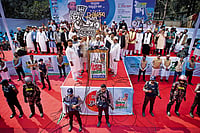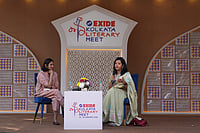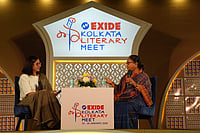Bangladesh is seeing a wave of protests on social media following the attack and vandalism of a qawwali musical event at the Dhaka University campus on January 12, allegedly by the student wing of the country’s ruling party, the Awami League, which boasts of its secular credentials.
Qawwali is a Sufi tradition of devotional music endemic to the Indian sub-continent. In Pakistan, qawwali singers have often come under attack from Islamic fundamentalists for allegedly being anti-Islamic. In Bangladesh, qawwali itself is not very popular but qawwali’s close relative, songs of the staunchly secular Baul-Fakiri tradition, had previously come under attack from Islamic fundamentalists.
However, this attack on the qawwali event alleged by the secular forces has blown up into a major controversy, even though the accused organisation, the Chhatra League, has denied its involvement.
Soon after the news of the vandalism broke, people, including prominent intellectuals, took to social media condemning the attack. However, there also were Awami League supporters who argued that such programmes are being organised in a bid to ‘re-introduce Urdu’ in Bangladesh.
The Facebook post of Khaja Osman Faruquee, a member of Lion’s Club in Chittagong, on January 12 evening, reflects the faultlines the country faced threats from: “On the one hand, we have the religious bigots who love issuing fatwas, and on the other, we have the stupid lot blinded by an excess of conscience and the opium of nationalism. They have no idea that culture knows no borders… Bangladesh awaits a qawwali revolution.”
The next day, prominent Bangladeshi author and columnist Farhad Mazhar, known as a critic of the Sheikh Hasina government, suggested in a Facebook post that students of Dhaka University needed to organise more such qawwali events on the campus to give a befitting reply.
The organisers of the vandalised event, indeed, held another programme at the same venue in the evening of January 13. It drew an impressive crowd, including protesters and the media. Since then, qawwali events were organised in the districts of Khulna, Chittagong and Kumilla to protest the vandalism. On social media, many are sharing famous qawwali songs highlighting its rich musical heritage and secular-devotional nature.
According to reports in the major Bangladeshi media, Chhatra League leaders from the university campus initially put forward the theory that fundamentalist elements were behind organising the event. Some even cited that qawwali is sung in Urdu, whereas Bangladesh was born freeing herself from Pakistan’s imposition of Urdu on the Bengali-speaking people.
However, in the face of criticism in the mainstream media and social media, the Chhatra League’s tone changed.
The organisation’s Dhaka University unit secretary Saddam Hossain told the local media that the organisers themselves were divided on the question of whether qawwali was Islamic or un-Islamic and the vandalism was a result of their internal trouble. He even announced that the League will also organise a qawwali event on the campus soon.
Outlook reached out to Hossain for his comments. The report will be updated once we receive any.
This was the first qawwali concert organised on the university campus. According to the organisers, a few hours before the event, those supposed to supply the sound system were threatened and asked not to supply their equipment if they wanted safety. Therefore, the programme started without any sound system. There still was a large gathering. The attack happened all of a sudden, injuring several organisers and participants.
A professor of Dhaka University, who spoke to Outlook on the condition of anonymity, said that Bangladesh in recent years has been plagued with two major societal problems – religious intolerance and governmental authoritarianism.
“While the religious fundamentalist forces had launched many attacks on cultural events in the past, terming those as anti-Islamic, the ruling party does not want to give any space to the opposition. In this case, I think, the second factor worked,” the professor said.
Speaking to Outlook over the phone, writer Swakrito Noman, who works at the Bangla Academy, an autonomous institution funded by the government of Bangladesh, nearly echoed the professor. He condemned vandalism, saying that music has always helped the fight against religious fundamentalism and bigotry.
“I don’t think Urdu was an issue. It seems quite apparent now that the Chhatra League wanted to get involved in the event and take the credit for organising it. However, the organisers did not want to involve the League’s leaders. The vandalism happened out of that grudge,” Noman said.
According to Noman, the League’s opposition on the campus include a wide spectrum of forces – from religious fundamentalist, moderate religious and progressive to Leftist forces. The organisers belonged to the opposition camp.
The event was organised by a Dhaka University-based qawwali group, named Silsila. It appears that some of the organisers were linked with Chhatra Adhikar Parishad, a student organisation in the opposition space. It is the student wing of the political party, Gana Adhikar Parishad, launched by former student leader Nurul Haque Noor. Jahid Ahsan, the literary secretary of Chhatra Adhikar Parishad, was among the organisers.
Speaking to Outlook over the phone, Lutfor Rahman, who leads the group Silsila, rubbished the charge of internal trouble among organisers.
“The allegations of dispute among organisers or the charge that Urdu qawwali songs go against the ethnic construct of the Bengalis are simply baseless. Neither does qawwali have any link with religious fundamentalism nor is language a matter of concern in music. The Chhatra League did not want anyone other than them to organise a big event,” said Rahman, a masters’ degree student in the Arabic department of Dhaka University.
He thinks that the attack has rekindled people’s interest in qawwali and that he hoped qawwali will gain greater popularity in Bangladesh in the days to come.
Going by how culture-lovers were flooding the social media spheres with qawwali songs, he might not be wrong to pin his hope on a revival of the genre.
Qawwali, at one time, was quite popular in Bangladesh, especially in Dhaka and Chittagong. However, since most of the qawwali singers spoke Urdu, their situation deteriorated after East Pakistan freed itself to form Bangladesh in 1971, through a bloody war, protesting Urdu-imposition by West Pakistan. Qawwali singers, on the one hand, faced threats from Islamic fundamentalists for their alleged un-Islamic practices, while on the other the secular forces like Awami League did not patronise them either.
However, there also exists a long tradition of qawwali composed in Bangla. Even Kazi Nazrul Islam, the national poet of Bangladesh, had composed some qawwali songs. There also are some baul songs sung in qawwali melody.
Qawwali songs composed in Bengali are sung in West Bengal, too.


























